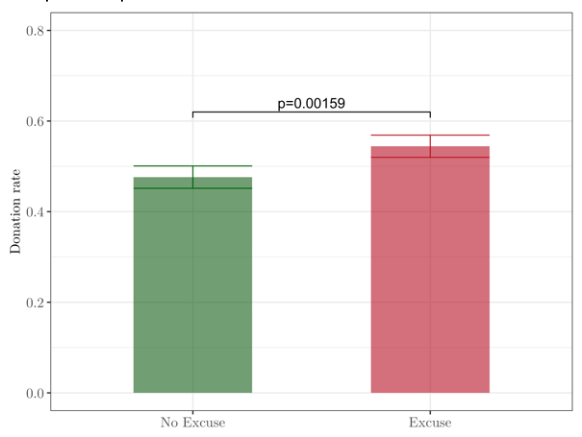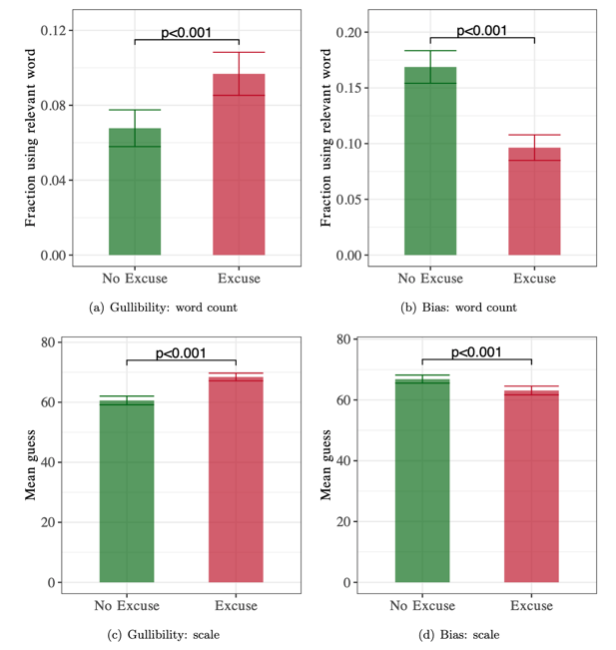Naked racism is taboo in most circles (Loury 2003, Jordan 1974). Instead, people often couch racist statements or behaviours in justifications that reduce their social stigma (Nelsen 2013). For example, a wide range of claims have been used to justify the adoption of anti-immigrant policies, such as the construction of the US-Mexico border wall.1 Common claims are that immigrants steal jobs from Americans, place undue burdens of taxpayers, increase crime rates, engage in terrorist activities, and have even brought COVID-19 into the country.2 One of the few things these claims have in common is that they have little to no basis in fact.
Justifications as excuses
We hypothesise that people use justifications as ‘excuses’ to express views that would otherwise be socially stigmatised. Suppose I privately dislike immigrants simply because I am xenophobic and intolerant of other cultures. I cannot express this opinion in public without incurring social stigma. Yet the moment that a justification to oppose immigration becomes widespread – for example, a prominent politician claims that immigrants commit crimes at higher rates than citizens – I have an excuse: I tell others that my anti-immigrant views stem from this reason and therefore avoid being seen as a racist. Whether or not I believe the justification is irrelevant. Indeed, whether or not others believe the justification is also largely irrelevant: what matters is that others believe that I believe the justification. Perhaps they think I’m gullible, I get news from different sources, or I’m disproportionately averse to crime, but as long as they judge me less harshly for these alternative possibilities than for being racist, common knowledge of the existence of this justification will make me more willing to publicly express my xenophobic views.
This mechanism has two important testable predictions:
- People should be more willing to engage in a socially-stigmatised public action if they can attach a justification to their public action. This mechanism should operate over and above private persuasion: people who are informed of the justification in private should be less willing to take the public action than those who are able to advertise the fact that they were exposed to the justification.
- When judging others who have taken some socially-stigmatised public action, people judge others to be less intolerant and more persuadable when they know that others were exposed to a justification for their behaviour.
In a recent paper (Bursztyn et al. 2020a), we examine these predictions through two large-scale online experiments.
Excuses and xenophobic expression
In our first experiment, we recruit a representative sample of over 3,000 Republicans and Independents and study whether they are more willing to publicly authorise a donation to an organisation that supports constructing a wall along the US-Mexico border when they have an excuse available.
We begin by informing participants about a recent study claiming that undocumented immigrants in Arizona commit crimes at substantially higher rates than comparable US citizens.3 We then give them the opportunity to authorise a donation to the anti-immigrant organisation and tell them that their individual donation decisions will be posted on our website, which we will publicise in their local area. This generates a social cost of authorising a donation, particularly in more Democratic areas where respondents presumably expect a greater fraction of their neighbours to disapprove of the donation.
Our main experimental treatment varies only the availability of an excuse for donating. In particular, participants in the ‘Excuse condition’ are told explicitly that their audience will learn that they knew about the study claiming that immigrants commit crimes at higher rates before authorising their donation. Participants in the ‘No Excuse condition’ believe that their audience will not know that they learned about the study. Crucially, participants in both conditions privately learned about the study, thus holding any persuasive effects of the study fixed across treatment arms and allowing us to isolate the effect of a public excuse on donation rates.
As shown in Figure 1, excuses matter: participants are 6.3 percentage points more willing to donate to the pro-wall organization when they have an excuse. Moreover, the effects are largest among respondents who live in the most Democratic areas (controlling for individual political affiliation and a range of demographics), further evidence that perceived social stigma drives our effects.
Figure 1 Xenophobic expression with and without an excuse
Excusing xenophobic behaviour
Our second experiment examines the ‘receiving end’ of excuses: do we judge people who express xenophobic views less harshly if we believe them to have an excuse? We recruit a representative sample of over 3,000 Democrats (the group most likely to disapprove of anti-immigrant expression), and we describe the study finding that undocumented immigrants in Arizona commit crimes at greater rates than US citizens. We then inform them that we have matched them with a participant in a previous study who authorised the donation to the pro-wall organisation.
Our key treatment manipulates our subjects’ knowledge about their partner’s information set at the time of making the decision. Subjects in the Excuse condition are matched with a partner who knew about the study before making their decision, whereas subjects in the No Excuse condition are matched with a partner who did not know about the study. Thus, according to our framework, subjects in the No Excuse condition should perceive their partners to be more intolerant than subjects in the Excuse condition, since these partners were willing to publicly donate to the pro-wall organization without even an excuse for doing so. Moreover, subjects in the Excuse condition should perceive their partners to be more persuadable, since these partners may have donated because they were persuaded by the study (rather than because they held deeper anti-immigrant views).
To capture participants’ beliefs about their partners’ characteristics, we first ask them to write a few sentences describing their best guess as to why their partner donated. We then analyse these responses to shed light on differences in perceived motives across treatment arms. In describing their partners’ motives, participants who matched with a partner who had no excuse are 70% more likely to use a word related to intolerance and 43% less likely to use a word related to gullibility, relative to participants matched with a partner with an excuse. We then ask participants to estimate their partners’ scores on tests of intolerance and gullibility, and we find similar treatment effects: participants guessed that partners with an excuse scored 0.14 standard deviations lower on the intolerance scale and 0.32 standard deviations higher on the gullibility scale.
Figure 2 Judging excused versus unexcused xenophobic expression
Broader implications
How does our evidence connect to policy? For one thing, it highlights another danger of biased media. Beyond the direct persuasive power of the media (DellaVigna and Kaplan 2007, La Ferrara et al. 2012, Yurukoglu and Martin 2017, Bursztyn et al. 2020b), the media can also increase socially-stigmatised behaviour by providing viewers with ready-made excuses. Even if viewers do not believe these justifications, they can claim to believe them to avoid social stigma -- and these claims become more credible the more widely the justifications are peddled. In the same way, politicians also use excuses to great effect, energising supporters or even launching campaigns upon demonstrably false justifications, such as the claim that Mexican immigrants disproportionately commit violent crime. Dog-whistles (“welfare queens”), vague appeals to unspecified sources (“a lot of people are saying that…”) and efforts to discredit trusted sources such as government agencies, scientists, and mainstream media outlets facilitate these tactics by blurring the line between truth and fiction.
There may be no silver bullets, but we can make it harder for people to use excuses to justify racist behaviour. When a prominent politician claims that immigrants are violent criminals, everyone is aware of the claim; and more concerningly, everyone is aware that everyone is aware of the claim, thus making the narrative an effective excuse for anti-immigrant expression. Since false claims are debunked in less public settings – news shows or websites of particular political slants – people can credibly deny knowing that they are inaccurate. Measures such as fact-checking politicians in real time might therefore have significant effects on public behaviour, even if relatively few people change their private views as a result.
References
Andrews, K T and M Biggs (2006), “The Dynamics of Protest Diffusion: Movement Organizations, Social Networks, and News Media in the 1960 Sit-Ins”, American Sociological Review 71(5): 752–777.
Bursztyn, L, A Rao, C Roth and D Yanagizawa-Drott (2020), "Misinformation during a pandemic", University of Chicago, Becker Friedman Institute for Economics Working Paper 2020-44.
Bursztyn, L, I K Haaland, A Rao and C P Roth (2020), “I Have Nothing Against Them, But... No”, National Bureau of Economic Research, Working paper w27288.
DellaVigna, S and E Kaplan (2007), "The Fox News effect: Media bias and voting", The Quarterly Journal of Economics 122(3): 1187-1234.
Hooker, J (2016), “Black Lives Matter and the Paradoxes of U.S. Black Politics: From Democratic Sacrifice to Democratic Repair”, Political Theory 44(4): 448–469.
La Ferrara, E, A Chong and S Duryea (2012), "Soap operas and fertility: Evidence from Brazil", American Economic Journal: Applied Economics 4(4): 1-31.
Loury, G C (2003), "Racial Stigma: Toward a New Paradigm for Discrimination Theory", American Economic Review 93(2):334-337.
Jordan, W D (1974), The White Man’s Burden: Historical Origins of Racism in the United States, A Galaxy Book, Oxford University Press.
Martin, G J and A Yurukoglu (2017), "Bias in cable news: Persuasion and polarization", American Economic Review 107(9): 2565-99.
Nelson, J K (2013), “Denial of racism and its implications for local action”, Discourse & Society 24(1): 89–109.
Endnotes
1 E.g. https://www.politico.com/story/2019/01/08/trumps-evolving-reasons-border-wall-1088046.
2 In a motivating survey experiment, we find evidence that these justifications reduce the stigma associated with expressing racist views. 32% of respondents agree to publicly endorse the statement “I support a permanent ban on Mexican immigration,” while 51% of respondents agree to publicly endorse the statement “I support a permanent ban on Mexican immigration to protect the US from contagious diseases, such as the coronavirus.”
3 In order to ensure that our respondents are not misinformed, we debrief them at the end of the study and provide them with a meta-analysis summarizing the literature on the relationship between immigration and crime.








